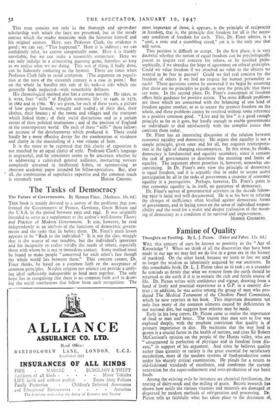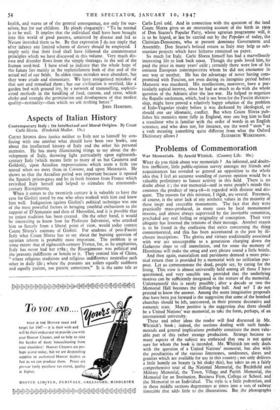Famine of Quality
Thoughts on Feeding. By L. J. Picton. (Faber and Faber. 12s. 6d.)
WILL this century of ours be known to posterity as the " Age of Knowledge"? When we think of all the discoveries that have been made in our age we may feel we do live in a great era in the history of mankind. On the other hand, because we learn so fast we tend to forget the wisdom so laboriously acquired by our ancestors. In this remarkable book, Dr. L. J. Picton takes us to task ; as a crusader he reminds us firmly that what we remove from the earth should be returned to the earth if it is to remain the rich and fertile source of life. Dr. Picton writes with confidence and vigour, drawing from a fund of lively and practical experience as a G.P. in a country dis- trict • in addition, he was active among the group of men who pro- duced The Medical Testament of the Cheshire Panel Committee, which he now reprints in his book. This important document not only lists many of the common ailments caused by deficiencies in our national diet, but suggests how reforms may be made.
Early in his long career, Dr. Picton came to realise the importance of food to man and beast. The truism that man eats to live was explored deeply, with the resultant conviction that quality is of primary importance in diet. He maintains that the way food is grown is a crucial factor in the health of nations, and cites Sir Robert McCarrison's opinion on the people of the Hunza valley, who are " unsurpassed in perfection of physique and in freedom from dis- ease," in support of his argument. And since he believes quality rather than quantity or variety is the great essential for satisfactory metabolism, most of the modern systems of food-production come under his sharply critical examination. He pleads for a return to old-fashioned standards of excellence, and condemns the current veneration for the super-refinement and over-production of our basic foods.
Among the existing evils he instances are chemical fertilisation, the rearing of dairy-stock and the milling of grain. Recent research has shown how easily the various vitamins and minerals are damaged or dispersed by modern methods of refrigeration and processing. Dr. Picton tells us faithfully what has taken place to the detriment of health, and warns us of the general consequence, not only for our- selves, but for our children. He pleads eloquently: " To be normal is to be well. It implies that the individual' shall have been brought into this world of good parents, untainted by disease and fed as Nature intended them to be. By that expression I do not imply that after infancy any limited scheme of dietary should be employed. I imply only that their food shall have followed the commonsense principles which we have discussed in this volume. Very much dis- ease and disorder flows from the simple shortages in the soil of the human seed-bed. I have tried to indicate that the whole hope of the future lies mainly in the replenishment both of that and of the actual soil of our fields. In olden times mistakes were abundant, but they were crude and elementary. We have reorganised mistakes of that sort and remedied them ; but our civilisation is overlaid, like a garden bed with ground ivy, by a network of trammelling, sophisti- cated methods in the handling of food, custom, and error, which choke and strangle the germination and development of that modest quality—normality—than which we ask nothing better."
JOHN HAMPSON.



































 Previous page
Previous page